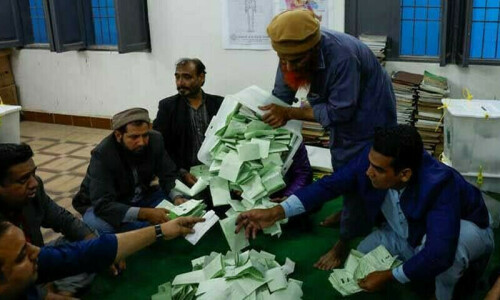PESHAWAR: One of the Jamaat-i-Islami leaders wasn’t far wrong earlier this month when he compared the party’s loosening grip on its stronghold of Dir districts to the fall of Granada, the last battle of Spanish Reconquista leading to the expulsion of Moors from Spain in 1492.
For the JI, the ‘grim prophecy’ came true rather quickly as the party was literally wiped out from its strongholds in Upper and Lower Dir.
On July 25, the party lost all three National Assembly seats to the Pakistan Tehreek-i-Insaf and managed to win only one of the total eight provincial assembly seats of the two districts.
The magnitude of defeat could be judged from the fact that the party’s chief, Senator Sirajul Haq, a candidate for a NA seat from home constituency, lost to the PTI’s little-known candidate with a huge margin of over 17,000 votes.
In 2013, the party had won both NA seats from Upper and Lower Dir and six provincial assembly seats.
Post elections, it became part of the province’s PTI-led ruling coalition and remained so for five years having a fair share of development funds to use primarily on both districts.
Provincial JI chief blames rigging for party’s electoral whitewash in two districts
Now, the question arises what went wrong with the JI.
The reason seems to be not too mystifying. The party content with its share of funds probably failed to grasp the reality that its stronghold was gradually slipping out of its hands.
The signs were already there. One of the JI’s NA members has managed to win the Lower Dir NA seat with a margin of 5,000 votes. The PTI candidate had stood second in the constituency. In 2015, a Pakistan Peoples Party candidate had defeated the JI nominee in by-polls.
Apparently, the JI leadership under Senator Siraj failed to know about the party’s dwindling fortunes and he steered the party to the fringes of the political wilderness.
As politician, Siraj focuses on public consumption. His optics is public attention and his social media appearances where one can see him trying himself to liken with the man on street albeit comically.
In The Vanguard of the Islamic Revolution: The Jamaat-i-Islami of Pakistan, Iranian-American academic Vali Nasr describes then party chief Qazi Hussain Ahmad as populist. Munwar Hasan, upon taking over was portrayed as someone with academic bent of mind, who would balance Qazi’s populism and reorient the party to its roots.
In contrast to both, Siraj just plays to the gallery without any regard for vision and policy. His attempts to garner public attention could at best be likened to a teenager’s obsession with social media persona.
Since 1985 when it lost Karachi to the rising MQM, the Jamaat’s political fortunes have been in flux. In the 1977 polls, it had won nine seats: two from Punjab three from the erstwhile NWFP and four from Sindh. In 1985, the party’s seats from Karachi reduced to two and it won four from the NWFP, while in 1988 elections, it was effectively eliminated from Karachi and managed to win five seats from Punjab and two from the NWFP.
It contested the 1990 polls under the banner of the Islami Jamhoori Ittehad and won eight NA and 20 provincial assembly seats from across the country.
In 1993 came the peak of Qazi’s populist streak as the party contested election under the Pakistan Islamic Front with slogan ‘Zalimo Qazi Aa Raha Hai’. However, it proved to be a disastrous venture as the party managed to win only three NA seats: one from Punjab and two from the NWFP.
The party ended boycotting the 1997 polls.
In 2002, party took part in elections under the banner of MMA religious alliance, which ended up winning the government of erstwhile Frontier.
However, the party boycotted the 2008 elections.
What makes 2018 significant is that this time around, the Jamaat has lost the pockets of support in Malakand, which it managed to retain despite its changing political fortunes.
It has left the party without its moorings.
Provincial JI chief Mushtaq Ahmad Khan thinks that the party’s electoral failure has more to do with external factors than internal ones.
He told Dawn that it was part of the same pattern, which happened to all political parties, which were denied the people’s mandate for them through pre- and post-election rigging.
Mr Mushtaq said while one party was facilitated, others were threatened and sidelined and of which all political parties were complaining.
“We are made to lose seven seats, including one each in Upper Dir, Buner and Malakand agency and four seats in Lower Dir with a difference of just to 1,000 to 1,500 votes,” he said.
Published in Dawn, July 28th, 2018














































